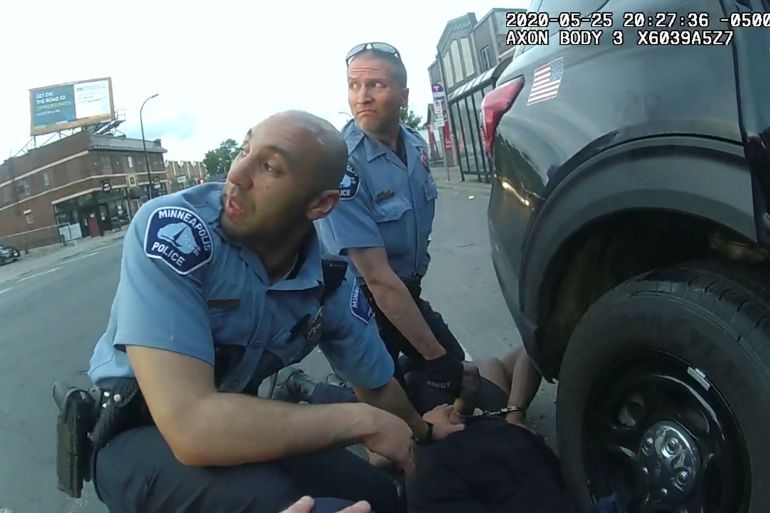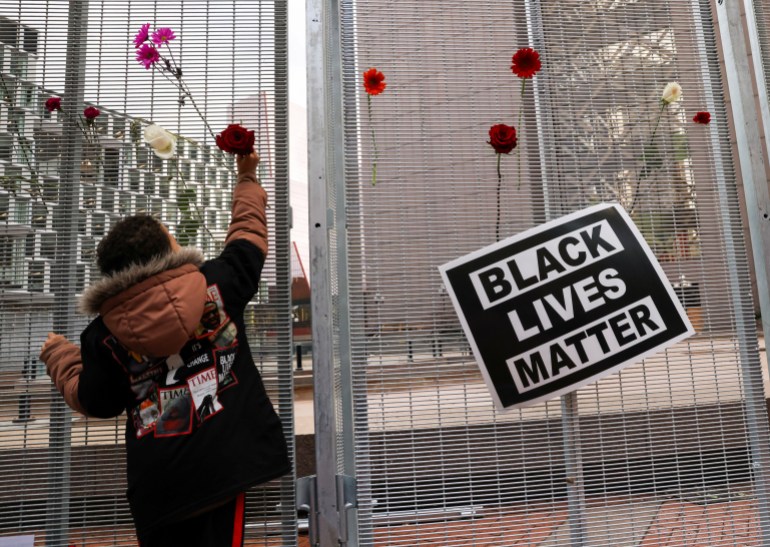‘Good faith error’: Chauvin asks for probation for Floyd killing
Prosecutors ask for 30 years in prison after the judge ruled aggravating factors allow for a harsher sentence.

A lawyer for former Minneapolis police officer Derek Chauvin has asked a judge for probation or a below-guidelines prison term when sentencing his client, who was convicted in April of murder and manslaughter in the killing of a Black man, George Floyd.
In a motion filed with Hennepin County District Judge Peter Cahill on Wednesday, lawyer Eric Nelson said Chauvin’s actions in pinning Floyd to the pavement during an arrest in May last year was “best described as an error made in good faith” based on his training.
Keep reading
list of 3 itemsDerek Chauvin asks for new trial after Floyd murder conviction
Chauvin faces hearing on violating George Floyd’s civil rights
“Mr. Chauvin asks the Court to look beyond its findings, to his background, his lack of criminal history, his amenability to probation, to the unusual facts of this case, and to his being a product of a ‘broken’ system,” Nelson wrote.
The lawyer asked the judge for a so-called dispositional departure resulting in probation or a downward durational departure, which he said would lead to a sentence less strict than the 128 to 180 months suggested by state guidelines.
A Minneapolis jury found Chauvin, 45, guilty of second- and third-degree murder and manslaughter on April 20 after hearing three weeks of testimony in a highly publicised trial. He is scheduled to be sentenced on June 25.
Floyd’s May 25, 2020, death – after he was handcuffed on a Minneapolis street with Chauvin’s knee on his neck for more than nine minutes – prompted enormous protests against racism and police brutality across the US and in other countries.
Last month, Cahill found that prosecutors had shown there were four aggravating factors in the death of Floyd, 46.
The judge said Chauvin abused his position of trust and authority and treated Floyd with particular cruelty. He committed the crime as part of a group with three other officers and did so with children present, Cahill also ruled.
In their own filing, prosecutors argued that Chauvin acted with cruelty, among other aggravating factors and therefore deserved twice the maximum sentence or 30 years in prison.
In Wednesday’s motion, Nelson said the fact that officers on the scene called for an ambulance “served to mitigate any cruelty” in the treatment of Floyd. Chauvin, he noted, remained on the scene until medical assistance arrived.

“Mr. Chauvin has established that he is particularly amenable to probation and is a prime candidate for a stringent probationary sentence plus time served,” Nelson wrote.
Nelson has also requested a new trial for Chauvin, citing the highly publicised nature of court proceedings, among other factors.
The US Justice Department has also charged Chauvin, along the three other officers, Thomas Lane, Tou Thao and J Alexander Kueng, with violating Floyd’s civil rights during the deadly arrest.
The move has been seen as a signal of the priorities of the administration of US President Joe Biden, who promised to confront racism during the campaign.
Advocates welcomed Chauvin’s conviction as a starting point for meaningful reform of policing.
Floyd’s family members, some of whom met with Biden on the one-year anniversary of Floyd’s killing on May 25, have urged US legislators to pass police reform legislation that has been stalled by policy disputes.